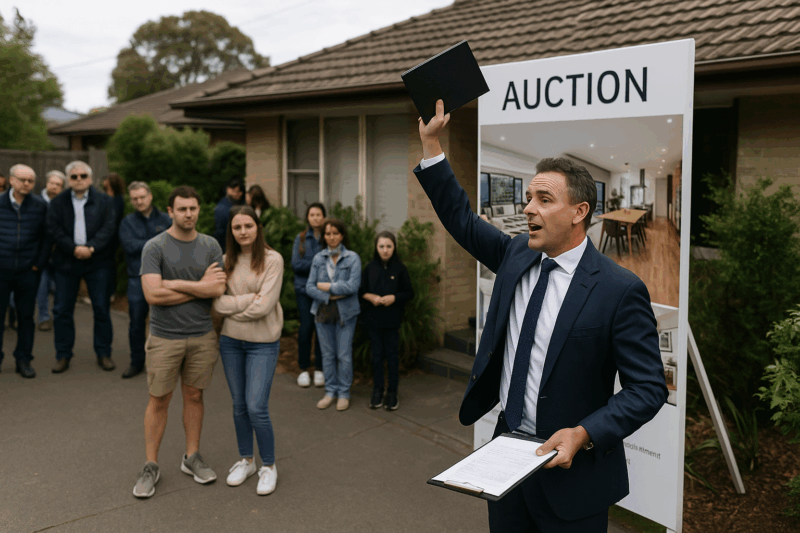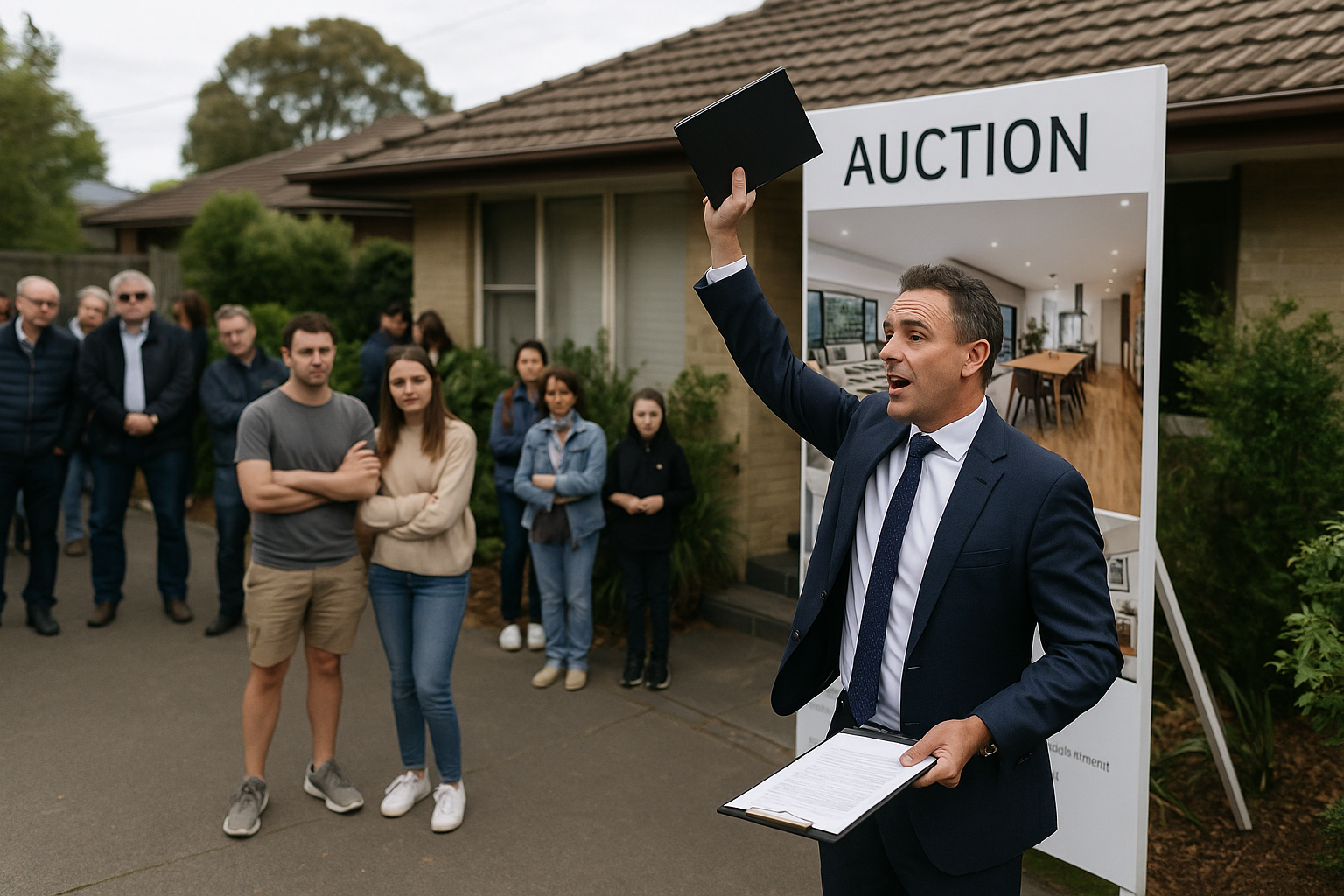
Key takeaways
Vendors and agents will now have to publicly publish the reserve price at least seven days before an auction. If they don’t, the auction can’t legally proceed.
This is designed to eliminate underquoting, but it also freezes price-setting at the very point when campaigns typically gather the most meaningful market feedback.
Agents fear sellers will set overly high reserves early to “play it safe,” and buyers may anchor to those figures, reducing bidding intensity. The result could be fewer competitive auctions and lower clearance rates — the opposite of what a healthy market needs.
NSW’s peak body calls the reforms political theatre rather than genuine consumer protection.
They argue the rules misunderstand how auctions work, misrepresent vendors as villains, and use the housing crisis as a popularity tool rather than addressing real market issues.
Underquoting has been a long-standing problem, but mandating early reserve disclosure risks harming auction outcomes without solving the underlying issue
If you thought Victorian property reforms had already gone far enough, think again.
A new set of rules will soon require reserve prices to be publicly disclosed at least seven days before a property goes under the hammer – and unless that happens, the home can’t legally be auctioned.
Currently, Victorian regulations require selling agents to provide a price guide, but do not require disclosure of the seller’s reserve price before the auction.
This gap can enable underquoting, where properties are advertised below their expected sale price to attract more bidders.
Just to make things clear…underquoting occurs when an agent advertises a property at a price significantly below the seller’s reserve or market expectations. It is illegal under federal consumer law and subject to further state-specific legislation.
The new law aims to close this loophole by requiring sellers and agents to disclose the genuine reserve price – the minimum amount the seller is willing to accept – at least seven days before the auction.
While some see it as a victory for transparency, others see it as political theatre dressed up as consumer protection.
And increasingly, the loudest criticisms are coming not from agents, but from peak bodies deeply concerned about the unintended consequences.
What’s interesting is that one of the strongest critiques isn’t coming from Victoria at all – but from the Real Estate Institute of New South Wales (REINSW), whose comments are blistering, highly quotable, and, frankly, worth unpacking.
Now to make things clear, underquoting has been around for years – in fact, decades – and I’ve long argued that it’s a blight on both the buying experience and the reputation of the real estate industry.
When buyers are consistently lured to homes that were never realistically within their budget, it creates frustration, distrust, and wasted emotional energy.
And from an industry perspective, it chips away at professionalism.
A transparent, well-run auction campaign doesn’t need games or gimmicks. It needs accurate price guidance, skilled agents, and properly educated practitioners who know how to read the market.
So while the intent behind cracking down on underquoting is a good one, we shouldn't pretend the problem is new – it’s been allowed to flourish for far too long.

What the Victorian Government has announced
The Andrews Government says the goal is simple: stamp out underquoting once and for all.
Under the forthcoming legislation:
- Agents must publicly publish a property’s reserve price at least seven days before the auction or fixed-date sale.
- All advertising and price guides must reflect that reserve.
- Auctions or sales cannot legally proceed unless the reserve is disclosed.
- Enforcement will be ramped up, with the underquoting taskforce now permanent.
Consumer Affairs Minister Nick Staikos positioned the reforms as essential to fairness:
“Underquoting isn’t fair, and it’s young Victorians and families paying the price.”
But not everyone is convinced this is the right lever to pull.
The industry backlash: “It’s gone too far”
Many Victorian agents argue that revealing the reserve a week out will distort market behaviour and ultimately disadvantage vendors.
It's the agent's job to work on behalf of the vendor, and I have found that many vendors initially set their reserve too high because they have unrealistic expectations for the value of their home, and eventually lower it as the auction date approaches and they get market feedback.
But it’s the REINSW that has delivered the most comprehensive and scathing critique – and their arguments go far beyond auction dynamics.
The REINSW’s take: a policy driven by politics, not principles
In a rare move, the REINSW publicly criticised reforms in another state, positioning the Victorian changes as deeply misguided.
Their CEO, Tim McKibbin, argues the reforms reflect a misunderstanding of both consumer behaviour and the auction process:
“Anyone who has sold a property via auction, and any agent with experience in this line of work, knows that the final week of the campaign is when the market’s view of a property's value truly comes into focus.”
In other words, locking in a reserve a week out freezes the campaign at precisely the moment when price discovery should be most dynamic.
But McKibbin goes further, accusing government of using the housing crisis as a political prop:
“The recent reforms… have been devised under the false guise of being in consumers’ best interests. What is apparent, though, is that both Governments do not view vendors as consumers.
This is another case of Government using the housing crisis as a popularity opportunity. Buyers are portrayed as the victims, vendors the villains, and Government the saviour.
It’s an abuse of the community’s trust.”
That’s unusually strong language for a peak industry body, but I tend to agree.
Why the REINSW says these reforms won’t help consumers
McKibbin argues the government already holds a vast dataset capable of improving transparency, but isn’t using it:
“Government holds a plethora of property data… Making that data freely available to consumers, with the tools to properly integrate it, would be far more valuable than limiting vendors from achieving the best price possible.”
In other words, if transparency is the goal, there are smarter ways to achieve it.
He goes on to argue that the real issue lies in the astonishingly low standards of agent training in many states:
“Prior to 2002, it took three years of TAFE study… Today, people can do a 3-day course with no exam and be permitted to handle… high value transactions.
It’s grossly inadequate. Accurately pricing a property takes knowledge and experience. Coordinating an auction campaign does too.
If Government is genuine about improving consumers’ experience, it must start with education and stop with derision.”

Note: This is the heart of the REINSW’s argument: The government isn’t fixing the real problem, it’s blaming industry instead of raising professional standards.
Will the reforms actually work?
From an investor’s perspective, I see three likely outcomes.
1. Vendors may start setting artificially high reserves
If you’re told to lock your reserve seven days out, the natural instinct is to “play it safe” and set it higher. This risks dampening competition before the auction even begins.
2. Buyers may anchor to the published reserve
Once the reserve is known, some buyers will treat it as the “real value” rather than a trigger point. This could reduce spirited bidding and shrink price gaps above the reserve.
3. Clearance rates could fall
With buyer psychology altered and vendor expectations inflated, auctions simply won’t be as fluid or competitive.
Put simply – the reforms may unintentionally reduce outcomes for sellers while doing little to fix the underquoting problem.
So what’s the better solution?
There are ways to enhance transparency without undermining auction effectiveness:
1. Raise education and licensing standards for agents
McKibbin is absolutely right: three-day real estate courses do not build professionals.
Quality training is the first line of defence against poor pricing practices.
2. Provide open access to government property data
Rather than controlling vendor behaviour, empower buyers with better market intelligence.
3. Increase penalties for intentional underquoting – not honest price discovery
Good-faith pricing is hard. Intentional deception is not. Regulation should focus on the latter.
4. Modernise consumer tools
Buyers shouldn’t rely on price guides alone - data-driven models, sold-price APIs, and AI-enhanced valuation tools all help reduce ambiguity.
Where this leaves us
Most people agree that underquoting is damaging – it wastes time, fuels distrust, and disadvantages genuine buyers.
But the Victorian Government’s newest reforms feel like the wrong solution to the right problem.
By forcing reserve prices to be disclosed a week out, the policy risks distorting auctions, locking in inflated vendor expectations, weakening bidding competition, and ultimately reducing sale outcomes.
The REINSW’s comments highlight the deeper issue:
If governments want a more transparent property market, they should start by lifting professional standards and empowering consumers with real data – not by handicapping vendors and demonising an entire industry.
This story isn’t over yet.
If NSW adopts similar reforms – and the REINSW fears it might – we’ll see an even larger national debate about the future of auctions and the balance between transparency and market dynamics.
For now, one thing is clear: Victoria is once again the testing ground for bold housing policy – but bold doesn’t always mean better.














